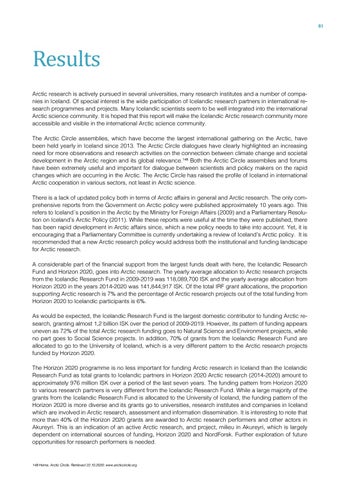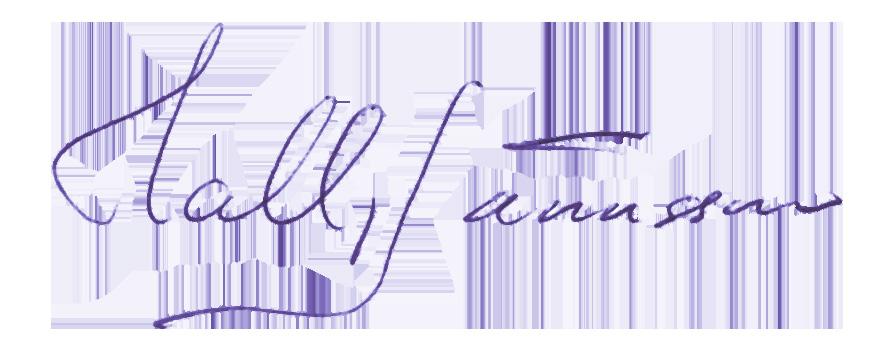61
Results
Arctic research is actively pursued in several universities, many research institutes and a number of companies in Iceland. Of special interest is the wide participation of Icelandic research partners in international research programmes and projects. Many Icelandic scientists seem to be well integrated into the international Arctic science community. It is hoped that this report will make the Icelandic Arctic research community more accessible and visible in the international Arctic science community. The Arctic Circle assemblies, which have become the largest international gathering on the Arctic, have been held yearly in Iceland since 2013. The Arctic Circle dialogues have clearly highlighted an increasing need for more observations and research activities on the connection between climate change and societal development in the Arctic region and its global relevance.148 Both the Arctic Circle assemblies and forums have been extremely useful and important for dialogue between scientists and policy makers on the rapid changes which are occurring in the Arctic. The Arctic Circle has raised the profile of Iceland in international Arctic cooperation in various sectors, not least in Arctic science. There is a lack of updated policy both in terms of Arctic affairs in general and Arctic research. The only comprehensive reports from the Government on Arctic policy were published approximately 10 years ago. This refers to Iceland´s position in the Arctic by the Ministry for Foreign Affairs (2009) and a Parliamentary Resolution on Iceland’s Arctic Policy (2011). While these reports were useful at the time they were published, there has been rapid development in Arctic affairs since, which a new policy needs to take into account. Yet, it is encouraging that a Parliamentary Committee is currently undertaking a review of Iceland’s Arctic policy. It is recommended that a new Arctic research policy would address both the institutional and funding landscape for Arctic research. A considerable part of the financial support from the largest funds dealt with here, the Icelandic Research Fund and Horizon 2020, goes into Arctic research. The yearly average allocation to Arctic research projects from the Icelandic Research Fund in 2009-2019 was 118,089,700 ISK and the yearly average allocation from Horizon 2020 in the years 2014-2020 was 141,844,917 ISK. Of the total IRF grant allocations, the proportion supporting Arctic research is 7% and the percentage of Arctic research projects out of the total funding from Horizon 2020 to Icelandic participants is 6%. As would be expected, the Icelandic Research Fund is the largest domestic contributor to funding Arctic research, granting almost 1,2 billion ISK over the period of 2009-2019. However, its pattern of funding appears uneven as 72% of the total Arctic research funding goes to Natural Science and Environment projects, while no part goes to Social Science projects. In addition, 70% of grants from the Icelandic Research Fund are allocated to go to the University of Iceland, which is a very different pattern to the Arctic research projects funded by Horizon 2020. The Horizon 2020 programme is no less important for funding Arctic research in Iceland than the Icelandic Research Fund as total grants to Icelandic partners in Horizon 2020 Arctic research (2014-2020) amount to approximately 976 million ISK over a period of the last seven years. The funding pattern from Horizon 2020 to various research partners is very different from the Icelandic Research Fund. While a large majority of the grants from the Icelandic Research Fund is allocated to the University of Iceland, the funding pattern of the Horizon 2020 is more diverse and its grants go to universities, research institutes and companies in Iceland which are involved in Arctic research, assessment and information dissemination. It is interesting to note that more than 40% of the Horizon 2020 grants are awarded to Arctic research performers and other actors in Akureyri. This is an indication of an active Arctic research, and project, milieu in Akureyri, which is largely dependent on international sources of funding, Horizon 2020 and NordForsk. Further exploration of future opportunities for research performers is needed.
148 Home. Arctic Circle. Retrieved 22.10.2020: www.arcticcircle.org



